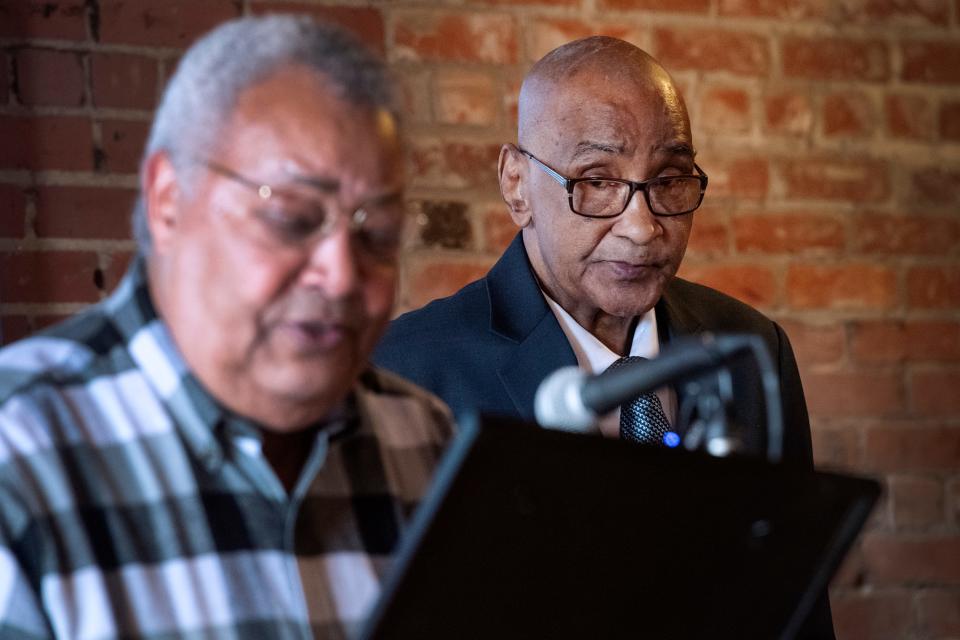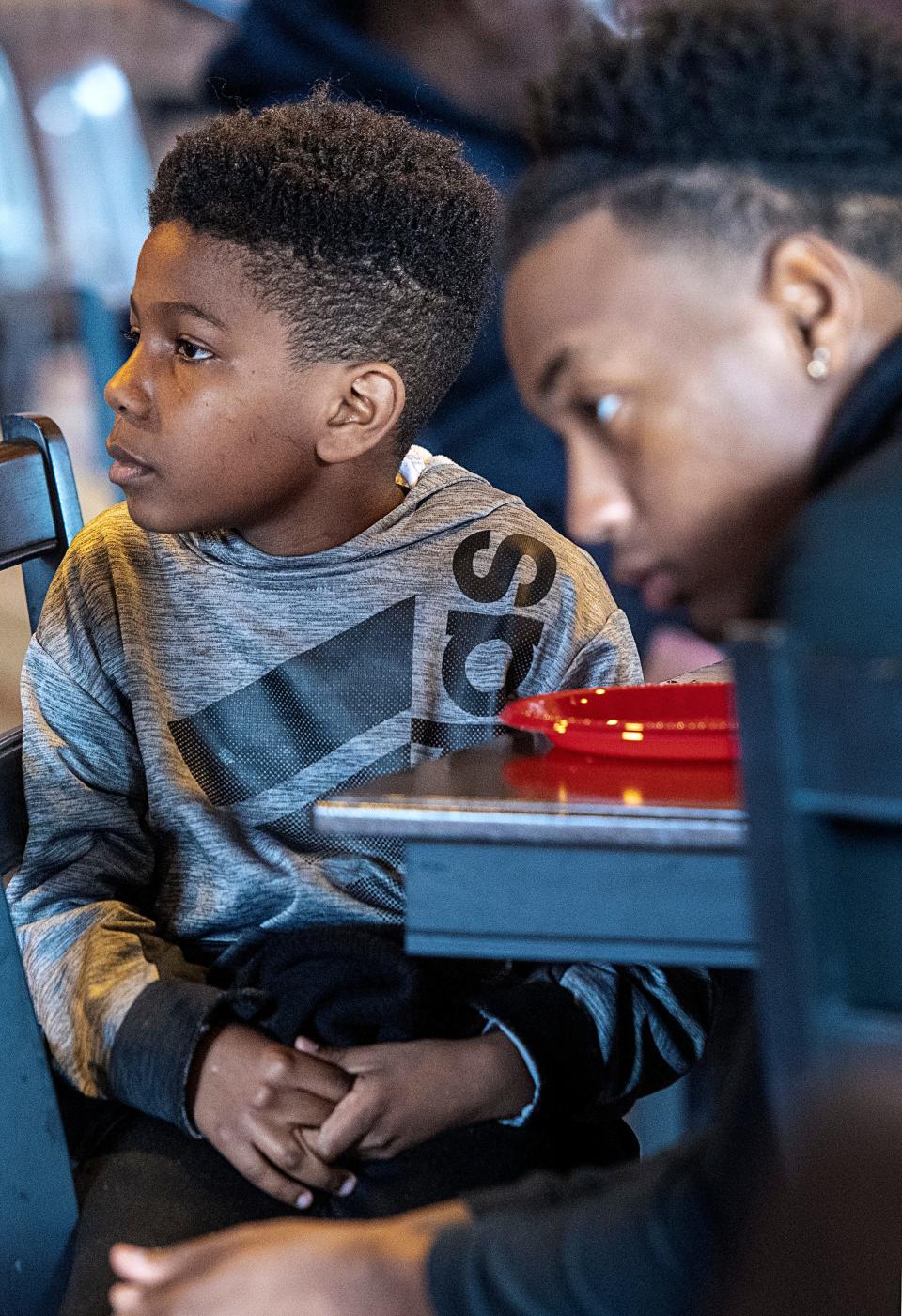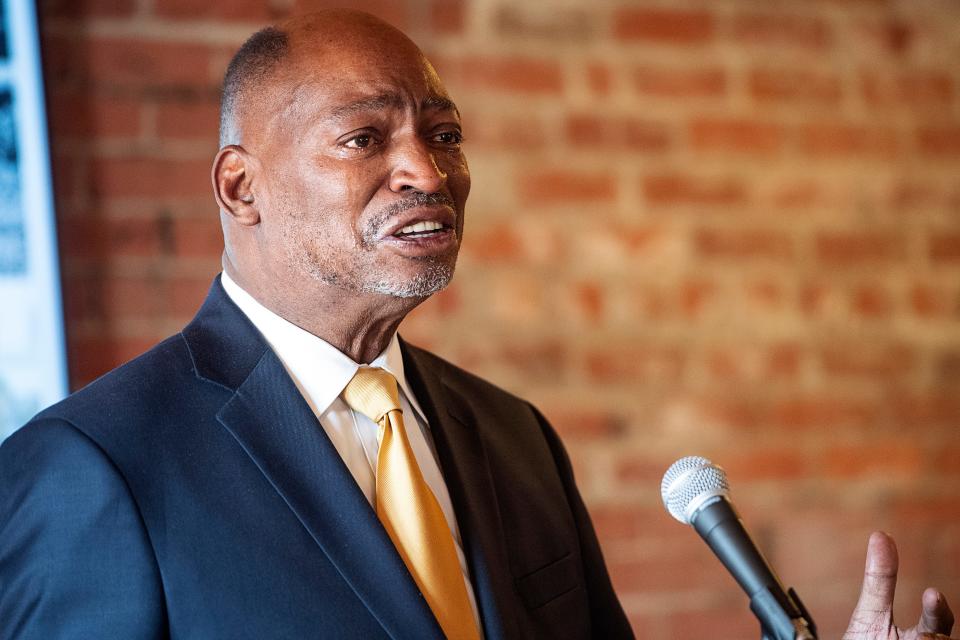Henry Logan, WNC's 'Jackie Robinson of college basketball,' gets long-overdue recognition
Henry Logan's relationship with attention has always been complicated.
There was a time the 6-foot guard was the center of it, drawing a bigger crowd than could fit at most any court he stepped on — the YMI, Hillcrest, Stephens-Lee, Western Carolina — a spotlight that also made him a target for racist slurs, harassment and discrimination as he broke color barriers across the region.
There were periods when he yearned for less of it, feeling the burden of his status as a basketball legend as he descended into alcoholism, roaming the streets of Asheville between jail stints.
More recently, with his life back on track, he's reluctantly embraced it. And if you ask the approximately 40 people gathered at the Village Pub in Biltmore Village for his 78th birthday celebration Tuesday, he deserves even more than the "long overdue" recognition he's recently received.
"When they talk about (my accomplishments), I think, 'Did I do all that?' " Logan said. "I still can't believe it. But it must have happened, because they're talking about it."
HIGH SCHOOL SPORTS: This week's top performers
YMI LAWSUIT: Fired executive director seeks $150K of backpay
Henry Logan's life journey is remarkable at every turn
Frustration with being the last player chosen during childhood pick-up games at the YMI drove Logan to develop into an all-state player early in his career at Stephens-Lee High School and a bona fide star by his graduation in 1964, such a captivating talent that the school moved some home games to the civic center.
"We all knew. We knew he was a special player," said Buncombe County commissioner Al Whitesides, who attended Stephens-Lee at the same time as Logan. "He was a talent you see once in a lifetime."
Logan won two state titles at Stephens-Lee, the all-Black, segregated high school that closed a year after his graduation as the Asheville school system integrated in the mid-1960s, years after desegregation was mandated by federal law.
He then became the first Black athlete to play for Western Carolina (then competing in the NAIA), and is believed to be the first Black athlete to play basketball at any predominantly white institution in the Southeast.
By the end of his four-year Catamount career, he had rewritten the school record book (3,290 career points), and his leaping, dribbling and passing ability had turned WCU games into must-see events. He drew spectators from all over the region, with some hitchhiking their way to Cullowhee to get a glimpse of the fabled guard who "could fly."
"He was just an outstanding athlete. A good football player as well, but an exceptional basketball player," legendary Asheville High coach Gene Hammonds said. "I couldn't say anything more positive. I can't find words to really express how much he has meant to me and to other citizens of Asheville."
But in some ways, Logan's star was burning too brightly. Damage to his knees cut his professional ABA career short after just two seasons, and more alarmingly, he was illiterate.
"Everybody has to accept some responsibility for that," longtime friend Eugene Ellison told the crowd Tuesday. "But he blames nobody. He says, 'That's my fault.' "

'They like me for who I am now, and I thank God for that, too'
Suddenly, Logan was back home in Asheville with no college degree and no ability to read, struggling with alcoholism and depression. He attempted suicide in 1979, before finding faith, teaching himself to read using the Bible and finally getting sober in 1992.
Only then did he begin receiving recognition for his accomplishments that otherwise may have come much earlier. He entered the WCU Hall of Fame in 1990 and the North Carolina Sports Hall of Fame in 2000.
"I didn't know people knew me like that. Especially when I got hurt and couldn't get a job, all the drinking and the stuff I did. But people done forgot about that," said Logan, who still lives in Asheville, where he and his wife help raise their grandchildren. "They like me for who I am now, and I thank God for that, too. He changed my life to be where I am now, and not who I used to be."

In Ellison's opinion, though, Logan's story is still not told in the proper light, nor shared widely enough.
"We've always praised his game, and we've been proud of his game. But what about his effort in leading us to learn how to live together?" Ellison said. "The lord took the ball out of his hands, but we all missed the story. (That) is the story."
The belief that Logan deserves more recognition, and that his story could help others, is what inspired Ellison to organize the birthday party for him, an effort that included city and county proclamations of March 14 as "Henry Logan Appreciation Day."
Even Ellison, who has seen the basketball star through each of his life's chapters, said he only recently came to truly understand the magnitude of Logan's accomplishments.
Many of the birthday party's attendees Tuesday are in a similar position: They know Logan primarily as a high school teammate, or a churchgoer, or the best player they ever saw play on the courts where they grew up, rather than a trailblazer whose story is well-known by Rick Barry, Julius Erving, Earl Monroe and more of the most famous basketball players in history.
And many of the patrons at the Village Pub bar, sitting 50 feet from the packed side room where the birthday party was held, likely wouldn't know his name at all.
That, Ellison says, is an injustice.
"He's so humble and he's so quiet, that sometimes he can walk through, and you not notice him," Ellison said. "Henry came along in a time that a lot of people don't want to remember, and don't want to deal with.
"But I want Henry Logan's story to be told. And I don't think this is the end, I think Henry Logan will be in the (Naismith Memorial) Basketball of Fame. Soon. Sooner than you think."

This article originally appeared on Asheville Citizen Times: Trailblazing basketball star Henry Logan receiving overdue recognition

